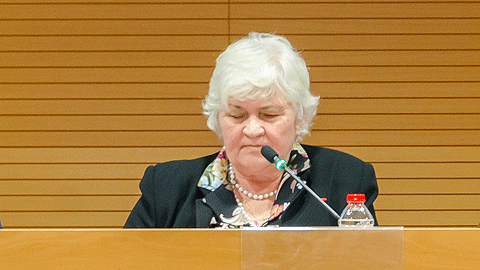"The death penalty is not about justice, it's about vengeance"

20/12/2016
Uzbek activist Tamara Ivanova Chikunova is the founder of Mothers Against the Death Penalty and Torture. She became involved in the fight against the death penalty after the execution of her son Dimitri, who was imprisoned for a death which, five years after being executed, he was finally declared innocent of after the case was reviewed. The arrest, sentencing and execution of Dimitri Chikunov was full of irregularities and both him and Chikunova, who was also temporarily imprisoned, were interrogated and beaten in order to obtain a false testimony. On 29 November, Chikunova gave a conference entitled "No Justice Without Life" at the Faculty of Law, in an event co-organised with the Community of Sant'Egidio.
When did your association begin its work?
It began in 2000 after the execution in July of my only son, Dimitri. His last wish was to make visible and help the people who are on death row. Once the association began its activities, many mothers (and fathers, siblings, etc.) of young people sentenced to death joined us.
Do you maintain contact with the prisoners?
I work personally with each of the prisoners. Many could not be saved and after every execution I would ask myself why this disgrace. I spent sleepless nights reading the letters these prisoners had sent to me. They asked me to fight against the verdict, they said that I was their last chance to save their lives...
What happens with those who are saved?
In Uzbekistan alone we have been able to save more than 100 people. In 2001, pfore example, a Russian citizen who had visited family in Uzbekistan was sentenced to death following an incident. He was saved and deported to Russia. Later he went on to university, got married and has two children. Among all the people who have been saved not one has committed an act of violence once they were set free. They all turn a page and begin a new life. When a life is saved, the world is saved. And that means a lot to me and to the memory of my son.
What consequences did abolishing the death penalty have for your country?
On 1 January 2008, capital punishment was abolished in Uzbekistan. Curiously, analyses have been made and the conclusion is that since then, violence has dropped by 30%. The real problem in Uzbekistan is the dictator regime. Many political dissidents are in prison.
What is the public opinion on this issue in Uzbekistan?
According to a study, three years after the death penalty was abolished, more than half of the population was in favour of it. We have realised that eliminating it is good because there is less violence in general and less murders in particular. That is something that not only happens in Uzbekistan, it happens in all countries where capital punishment no longer exists.
Your association works in collaboration with others?
We work very closely the Community of Sant'Egidio. We also collaborate with Amnesty International, Human Rights Watch and several American associations. When many voices join together against the death penalty, it is possible to have it abolished. When everyone remains silent, the problem is impenetrable.
Is there hope against the death penalty in countries where it is widely used, such as China, United States or Iran?
There is hope. Half of the United States have abolished it and the tendency is that is will slowly disappear. First of all, the mentality of the people in each country must change: fighting against an old way of thinking that requires vengeance. Many people do not understand that the death penalty is not about justice, but about vengeance.
Do the prisoners share any common characteristics?
They are all young. The majority are 18 to 30 years old, almost no one is over forty. They kill young people, they kill hope. A 28-year-old woman was sentenced to death and executed by firearm in Belarus. Why this violence? More are waiting to be executed by firearm. Belarus is the last country in Europe to continue to apply capital punishment.
You also fight against other types of violence.
In countries such as Spain, even though the death penalty does not exist, there are other fiorms of violence: people who sleep on the street are sentenced to death, too. Or the elderly who live alone and abandoned. Not to mention the citizens of Syria who could not save themselves through a humanitarian corridor, or Africans who suffer from disease, war, hunger, drought, etc. These problems do not have borders: we are all, in one way or another, responsible for the death of these persons. We should listen to their voice and lend them our hand.